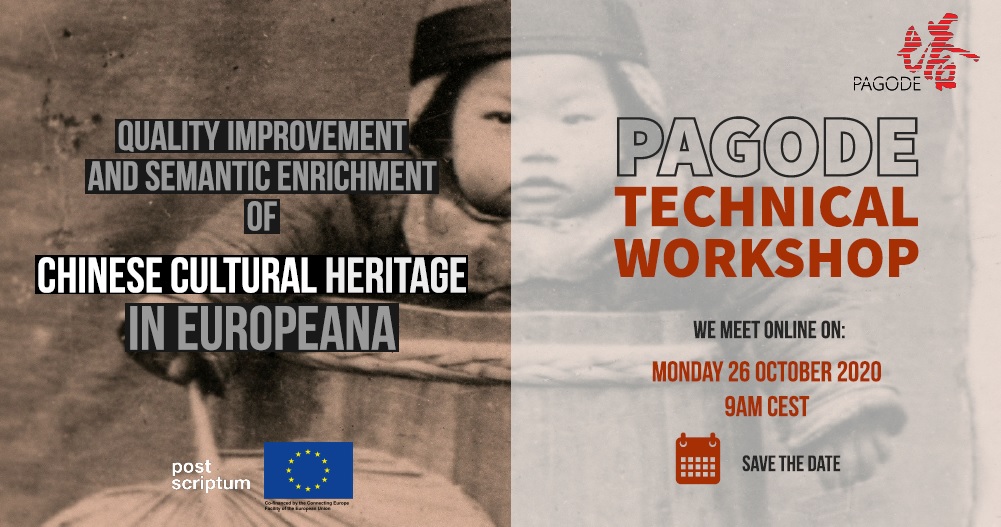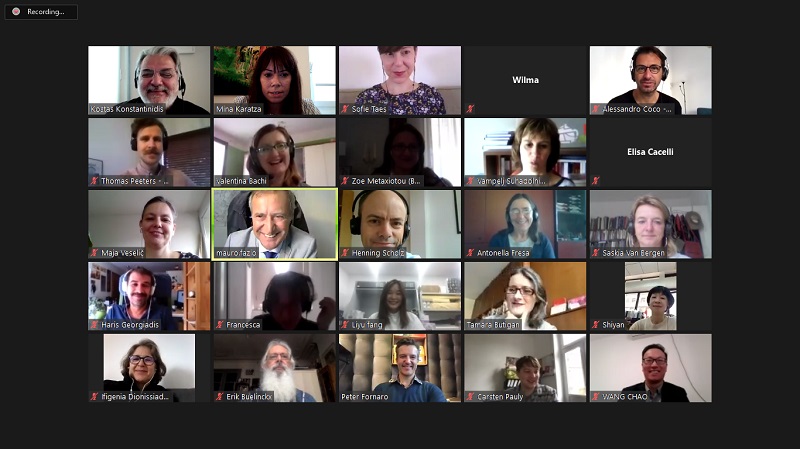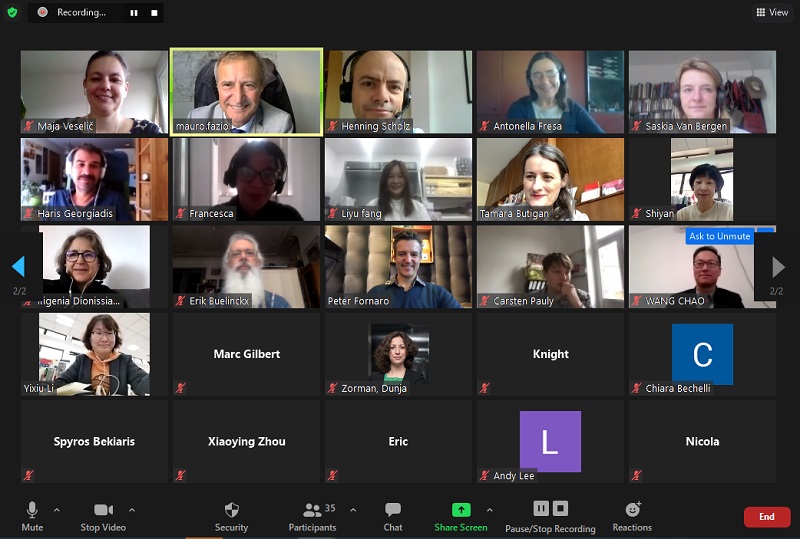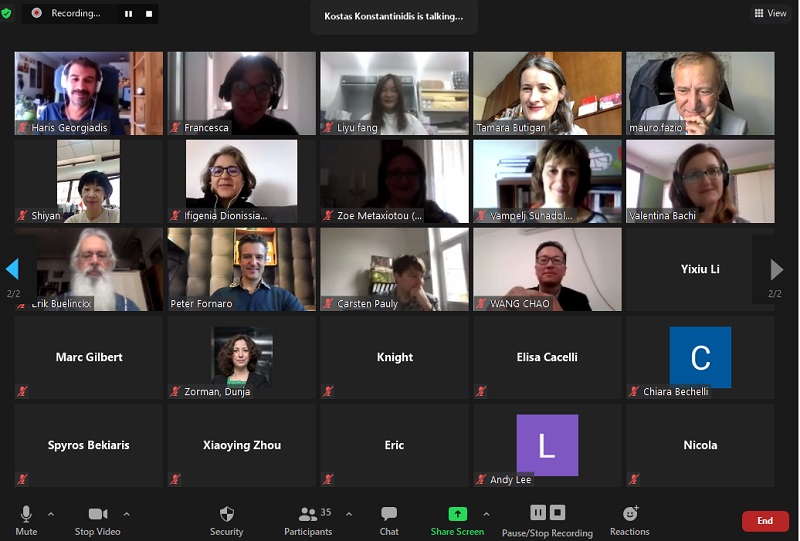Originally a project event focused on dataset enrichment, due to the covid-crisis this event was expanded and transformed in an online gathering, to discuss and share knowledge on metadata curation, strategies for the use of vocabularies and thesauri, semantic enrichment by natural language processing and entity extraction methods, all with a strong focus on building capacity inside Cultural Heritage Institutions. With the participation of Europeana, a section was specifically dedicated to the process of aggregation of data for publication in Europeana portal, also considering the requirements of the Europeana Publishing Framework.
PRESENTATIONS FROM THE SPEAKERS
- Kostas Kostas Kostantinidis, Postscriptum / Welcome and speakers’ presentations – PDF
- Henning Scholz, Partner & Operations Manager at Europeana Foundation / Deep impact – digital transformation with high quality data – PDF
- Maja Veselič, Dunja Zorman, Department of Asian Studies, Faculty of Arts, University of Ljubljana / The Use of Thesauri and Vocabularies in Chinese and China-related Cultural Heritage – PDF
- Valentina Bachi, Sofie Taes, Photoconsortium / “Scenes and People from China”: a crowdsourcing campaign to collect tags on heritage photography in Europeana – PDF
- Haris Georgiadis, Head of e-Services Unit, E-infrastructure and Information Systems Department, National Documentation Center (EKT) / Semantic Enrichment Strategy for SearchCulture.gr – PDF
- Vassilis Tzouvaras, Technical Consultant, PostScriptum / Semantic enrichment using natural language processing and entity extraction methods – PDF
- Orfeas Menis – Mastromichalakis, Researcher, Postscriptum / Automatic Enrichment tools – PDF
- Xiaoying Zhou, Digital Resources Integration Team at the National Library of China / Digital Resource Metadata Specification – PDF
- Liyu Fang, Senior Engineer at the Department of Digital Media, Palace Museum / The Management of the Digital Resources in the Palace Museum – PDF
Additionally, with the occasion of this event, participants had the opportunity to discover the PAGODE Annotation Pilot and to be involved in an annotation sprint to “Scenes and People from China”, by looking at images available in Europeana and adding more descriptive tags. “Scenes and People from China” is a carefully selected collection that offers a glimpse of life in China throughout the 20th century as well as portraits featuring people with Chinese roots or ancestors. From casually posing families to stately portrayed celebrities and from evocative landscapes to impressive heritage sites, this gallery helps to paint a picture of China seen through the eyes of its residents and visitors. Chinese communities abroad are depicted as well, adding an extra dimension to this visual reflection of Sino-European relations. With the annotation sprint we easily reached 100% of the annotation target!
 | Kostas Konstantinidis, CEO at PostScriptum Welcome Note |
 | Wang Chao Cultural Counsellor Embassy of People’s Republic of China in the Hellenic Republic Welcome Note |
 | Mauro Fazio, PAGODE Project Leader, Italian Ministry of Economic Development Welcome Note |
 | Antonella Fresa, Promoter, Technical Coordinator for PAGODE The PAGODE – Europeana China action Short bio: Antonella Fresa is the director of implementations at Promoter Srl and Vice-President of Photoconsortium. She is technical coordinator and communication manager of national and European projects on digital cultural heritage and project manager of digitalmeetsculture.net magazine of Promoter. Her interests lay in particular on virtual museums, digital cultural archives, participatory approaches in culture, smart cities, urban regeneration, digital preservation and e-infrastructures. She regularly serves as independent expert of the European Commission and of national and regional research bodies. She is an Enterprise fellow at Coventry University and member of the Advisory Board of CSI-COP project on citizen science |
 | Henning Scholz, Partner & Operations Manager at Europeana Foundation. Deep impact – digital transformation with high quality data Mr Scholz presented European Foundation, its priorities and ecosystem while he focused on the importance of the quality and openness of data and the impact it can have on institutions which publish content on the web and the benefits that can be created. Short bio: Henning is responsible for the relationships with cultural heritage professionals. As a paleontology curator and BHL-Europe coordinator, Henning contributed digital objects to the portal even before joining Europeana in 2012. |
 | Xiaoying Zhou, Deputy Leader of National Library Digital Resources Department of the National Library of China. Digital Resource Metadata Specification Ms Zhou presented the Metadata Application Framework (MAF), the Metadata structure, established in the National Library of China, the standardized the application process of metadata, and the research carried out from 1989 on standardizing data, the “Name Standardization Group” that was established in 1995. Short bio: Xiaoying Zhou, is a librarian, Digital Resources Integration Team and deputy leader of Chinese National Library Digital Resources Department. She is postdoctoral student of the Chinese National Library. Her research expertise is knowledge organization, data mining and digital resource integration. |
 | Liyu Fang , Senior Engineer at the Department of Digital Media, Palace Museum The Management of the Digital Resources in the Palace Museum Ms Fang presented the Palace Museum and the organization infrastructure, the management of the digital resources and all information activities taking place at the Palace Museum. Short bio: Liyu Fang joined the Palace Museum in 2004 as a developer. Through 16 years of work, she has rich experience in museum informatization. Her research focuses on digital preservation of cultural heritage and the century-long history of visual documentation of the Forbidden City. At present, she is curating the museum’s digital resources, and collection of old photos. |
 | Maja Veselič, Department of Asian Studies, Faculty of Arts, University of Ljubljana. Short bio: Maja Veselič is a sinologist with a PhD in anthropology. She works at the Department of Asian Studies, Faculty of Arts, University of Ljubljana where she teaches courses on contemporary China and conducts research on religion in East Asia. She is also a member of the project East Asian Collections in Slovenia, which aims to digitize East Asian objects in national and local museums, rendering the vast majority of these collections publically accessible for the first time. |
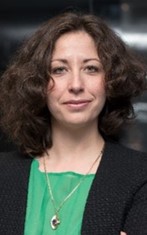 | Dunja Zorman, Department of Asian Studies, Faculty of Arts, University of Ljubljana. Short bio: Dunja Zorman holds a university degree in sinology and sociology. She has been working in the outbound Chinese tourism sector for more than a decade, though she has also spent several years in the more general China-related business consultancy. Now Dunja works as a research assistant in the Department of Asian Studies at the Faculty of Arts, University of Ljubljana, where she is researching new ways of presenting Chinese cultural heritage in Europe and the development of China-related cultural tourism. |
 | Valentina Bachi, Photoconsortium Short bio: Valentina Bachi is a project manager at Photoconsortium, Europeana’s thematic aggregator for photography, and she is an expert in the management and dissemination of digital cultural heritage projects. For PAGODE, she is in charge of the coordination of content providers for the ingestion of datasets to Europeana, and of the sustainability task |
 | Sofie Taes, Photoconsortium Short bio: Sofie Taes is an alumna of KU Leuven (Belgium), where she graduated in musicology and Medieval and Renaissance Studies. Currently she works at the Institute for Cultural Studies (CS Digital) at KU Leuven and at Photoconsortium, as a digital curator. She has curated a wide range of editorials and virtual exhibitions for Europeana as well as the physical exhibitions All Our Yesterdays, Thousands are Sailing and Blue Skies, Red Panic. Currently she is active in several European projects involving digital cultural heritage and user engagement strategies, among which Europeana XX: Century of Change, PAGODE – Europeana China and inDICEs. |
 | Haris Georgiadis, Head of the Digital Services Unit at the National Documentation Centre. Semantic Enrichment Strategy for SearchCulture.gr Short bio: Dr. Haris Georgiadis is Head of the Digital Services Unit at the National Documentation Centre. In this capacity he is managing, as technical and scientific coordinator, several European and national projects that collectively contribute to the development of a national infrastructure for high quality, interoperable, open access, scientific and cultural digital content and data. In particular, he is the technical director and the main developer of the National Aggregation SearchCulture.gr and the semantic enrichment infrastructure Semantics.gr. He has co-authored 7 scientific journal and conference articles that present various aspects of the above-mentioned infrastructure. Before joining EKT Haris worked in the private sector, as a Researcher at Oxford University’s Computing Lab and he has been a Software Engineer at the Europeana Foundation. He holds a Bachelor degree in Informatics from the University of Piraeus, a MSc at Information Systems and a PhD degree at Information Systems from the Athens University of Economics and Business. His research interests include designing of digital content management systems, processing and optimizing queries on non-traditional data, search engine optimization, metadata theory, semantic web and linked data. |
 | Vassilis Tzouvaras, Technical Consultant, PostScriptum Short bio: Dr. Vassilis Tzouvaras received the Bachelor of Engineering in the Department of Electronic & Systems Engineering of Essex University, the Master of Engineering in the Department of Automatic Control & Systems Engineering in Sheffield University in UK, and the Ph.D. in the Electrical and Computer Engineering Department of National Technical University of Athens in the field of knowledge technologies, and specifically in extending OWL with fuzzy set operators. Since 2005, he is a senior researcher at the Artificial Intelligence and Learning Systems (AILS) of NTUA and technical consultant at Postscriptum. He is carrying out research in the areas of machine learning, knowledge representation, ontology engineering, reasoning and semantic search. He is active in the Europeana developments and many related projects. He has published 15 journal papers and 60 conference papers. He is also member of the subgroup of the Digital Cultural Heritage and Europeana (DCHE) formed by the DGConnect which has been established to provide the DCHE with advice on certain aspects of the Europeana Digital Service Infrastructure, such as Europeana’s general objectives, governance, strategic priorities, evolution and sustainability. He is also technical consultant of the Enterprise Greece responsible for organising and promoting Greek startups. |
 | Orfeas Menis – Mastromichalakis, Researcher Orfeas Menis – Mastromichalakis is a graduate of the School of Electrical and Computer Engineering of the National Technical University of Athens (NTUA). He completed his undergraduate studies in November of 2019 in the field of Information Technology and his diploma thesis was “Art Style Recognition of Artworks with Convolutional Neural Networks”. Since then he works as a Research Associate in the Artificial Intelligence and Learning Systems Laboratory of the National Τechnical University of Athens, where he holds the position of Ph.D. student and researcher since October 2020. His research interests include Artificial Neural Networks, Image Processing and Analysis with CNNs, Fuzzy Systems, Explainable Artificial Intelligence (XAI), and Natural Language Processing (NLP). |
Programme and agenda: PDF
The PAGODE Technical Workshop is organized by the project team at PostScriptum, in collaboration with Photoconsortium and Europeana.


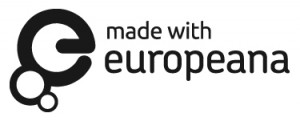
For any additional information contact us at mkar@postscriptum.gr
img. PostScriptum
PAGODE – Europeana China is co-financed by the Connecting Europe Facility Programme of the European Union, under GA n. INEA/CEF/ICT/A2019/1931839

